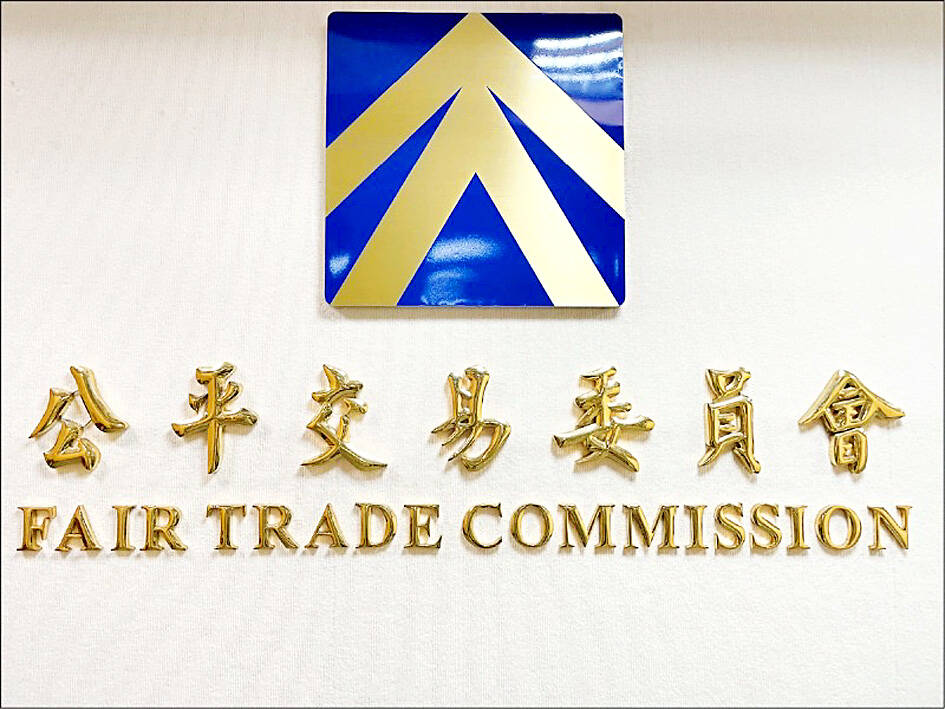Taiwan Mobile and Chunghwa Telecom were fined a total of NT$76 million (US$2.38 million) for jointly canceling incentives for subscribing to specific services after they led to a decrease of subscribers of services with higher tariffs, the Fair Trade Commission said yesterday.
The nation’s two largest telecoms in June and July 2018 separately offered a 4G service allowing subscribers to pay a monthly fee of NT$699, the commission said.
Internet access speed would not be reduced regardless of the amount of bandwidth subscribers used, it said.

Photo: Taipei Times
The telecoms also offered other incentives to attract subscribers, it said.
Subscribers of the monthly plan would not be charged voice communication fees if they made intra-network telephone calls. During the first six months of their contracts, they would only pay NT$666 per month for extra-network phone calls.
“Soon after the two telecoms made the monthly plan available, they found that a large percentage of new subscribers signed up to the service, which consequently led to a decline in subscribers of services with higher tariffs. They failed to increase revenue and attract more subscribers to services with higher tariffs after the introduction of the new monthly plan. They then wanted to cancel some of the incentives, move more subscribers to services with higher tariffs and decrease their financial loss in voice communication services,” the commission said.
Broadband services are controlled by three telecoms which offer very similar services, the commission said, adding that the pricing scheme was one of the strategies that they used to gain a competitive edge.
“As a telecom would risk losing its customers and market share if it unilaterally canceled certain incentives, Taiwan Mobile and Chunghwa Telecom then reached an agreement to jointly stop offering these incentives in October that year,” the commission said.
However, the concerted actions of the two telecoms caused Far EasTone Telecommunications to follow suit, and as a result none of the telecoms offered incentives to subscribers, the commission said.
As their actions weakened competition among telecoms and adversely affected the market, Chunghwa Telecom and Taiwan Mobile were fined NT$40 million and NT$36 million respectively for contravening the Fair Trade Act (公平交易法), the commission said.
The National Communications Commission (NCC) said in a statement that the Telecommunications Management Act (電信管理法) does not designate any dominator in the 4G service market.
As such, any promotional plan offered by telecoms does not need to be reviewed by the NCC, it said.
“We respect the Fair Trade Commission’s decision that Chunghwa Telecom and Taiwan Mobile had engaged in concerted actions,” the NCC said.
Taiwan Mobile and Chunghwa Telecom in separate statements said that it is regrettable that the Fair Trade Commission came to such a conclusion and would study taking legal action after receiving official documents of the ruling.
“Any change to the service plan we offered was made based on our business considerations, and we had neither motive nor necessity to engage in concerted actions with another telecom,” Chunghwa Telecom said. “It has been five years since we offered the monthly plan. The Fair Trade Commission might not be able to fully clarify and confirm relevant facts, resulting in a unfair and unfavorable judgement.”

POSITIVE DEVELOPMENT: Japan and the US are expected to hold in-depth discussions on Taiwan-related issues during the meeting next month, Japanese sources said The holding of a Japan-US leaders’ meeting ahead of US President Donald Trump’s visit to China is positive news for Taiwan, former Japan-Taiwan Exchange Association representative Hiroyasu Izumi said yesterday. After the Liberal Democratic Party’s landslide victory in Japan’s House of Representatives election, Japanese Prime Minister Sanae Takaichi is scheduled to visit the US next month, where she is to meet with Trump ahead of the US president’s planned visit to China from March 31 to April 2 for a meeting with Chinese President Xi Jinping (習近平). Japan and the US are expected to hold in-depth discussions on Taiwan-related issues during the

‘LIKE-MINDED PARTNER’: Tako van Popta said it would be inappropriate to delay signing the deal with Taiwan because of China, adding he would promote the issue Canadian senators have stressed Taiwan’s importance for international trade and expressed enthusiasm for ensuring the Taiwan-Canada trade cooperation framework agreement is implemented this year. Representative to Canada Harry Tseng (曾厚仁) in an interview with the Central News Agency (CNA) said he was increasingly uneasy about Ottawa’s delays in signing the agreement, especially as Ottawa has warmed toward Beijing. There are “no negotiations left. Not only [is it] initialed, we have three versions of the text ready: English, French and Mandarin,” Tseng said. “That tells you how close we are to the final signature.” Tseng said that he hoped Canadian Prime Minister Mark Carney

President William Lai (賴清德) yesterday bestowed one of Taiwan’s highest honors on Saint Vincent and the Grenadines (SVG) Ambassador Andrea Clare Bowman in recognition of her contributions to bilateral ties. “By conferring the Order of Brilliant Star with Grand Cordon on Ambassador Bowman today, I want to sincerely thank her, on behalf of the Taiwanese people, for her outstanding contribution to deepening diplomatic ties between Taiwan and SVG,” Lai said at a ceremony held at the Presidential Office in Taipei. He noted that Bowman became SVG’s first ambassador to Taiwan in 2019 and

A man walks past elementary school artworks at the Taipei Lantern Festival in Ximen District yesterday, the first day of the event. The festival is to run from 5pm to 10pm through March 15.